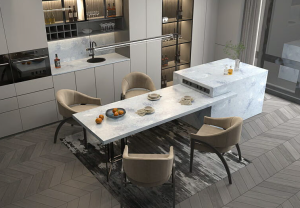Quartz is a durable material that is excellent at standing up against scratches, and it is commonly used for kitchens and bathrooms. That being said, while quartz is extremely durable, it is not completely scratch-resistant, Knowing what damages quartz will allow you to keep your countertops in a good shape and preserve their great looks. In the following article, we offer an in-depth guide on what can and cannot scratch quartz, and how to avoid this.
Hard Objects and Materials
Metal Utensils
If you use your quartz directly from the countertop, you run the risk of damaging it with scratches.
All it takes is some hard nudge with cutlery such as knives, forks the heavy duty work of cooking can also cause it to have scratch marks. QuartzHard and durable but can still get scratched by harder, sharper materials or edges. It is recommended to use a cutting board to prevent the surface when chopping or slicing.
Ceramic and Porcelain Items
Ceramic and porcelain goods (plates, mugs) can also scratch quartz, should they be dragged across the face. Quartz is softer than some of these materials, which are often used in other applications, and it may leave markings. To avoid this, you should put a mat or hot pad under things made of ceramics.
Abrasive Cleaning Pads
Scouring Pads and Steel Wool
Quartz Countertops Abrasive things like scouring pads or steel wool could leave tiny scratches on the surface of quartz counters. Because they are so shallow it takes time for the scratches they produce to show, however they can eventually wear down the polish and create a faded look. Simply, you should clean it with a soft cloth or sponge with clean water and a some cleaning agents that are made for these tough quartz surfaces.
Accidental Impacts
Heavy Items
Quartz Countertops – Quartz countertops will scratch or chip if you drop heavy items, such as pots, pans, or appliances. Source: While quartz is tough, it can still be chipped Taking care is advised to remove the back problems, like handling heavy objects, ladding protective padding or mats can help to reduce back problems.

Environmental Factors
Sand and Grit
Shoes or anything carrying some sand or grit, brought from the outside into the kitchen or bathroom if dragged on quartz countertops, will act just like sandpaper scratching the surface. Mopping and sweeping the floor more often and buying doormats for every door are also good practices for diminishing the grit that reaches your countertops.
Preventative Measures
Tip: Place cutting boards and trivets in various locations
Use cutting boards for food preparation and hot pads for hot pots and pans. That is when these basic tools act as a wall between actual harm and damage-causing entities and therefore, they play an important role in maintaining the finish and integrity of your countertops.
Gentle Cleaning Techniques
Mild, non-abrasive cleaners and soft cloths or sponges are the best tools to use when cleaning quartz countertops. This process ensures that your finish will not be dulled by micro-scratches that build up over time. Cleaning the countertops in the proper manner every other day ensures that the countertops retain both their appearance and longevity.
Protective Sealants
Quartz is non-porous and does not need sealing unlike marble or granite, but some homeowners decide to apply a seal for extra scratch and stain resistance. Talk to a professional to see if this is an option for your surface.
Conclusion
With some common sense tips and tricks, you can learn what not to put on quartz countertops and keep your kitchen looking sleek and scratch-free. With the use of cutting boards, trivets, and light cleaning methods, you can maintain the durability and design panache of quartz surfaces for decades to come. Read on to find out how quartz compares to other materials and get great care tips on how to keep looking like what scratches quartz.